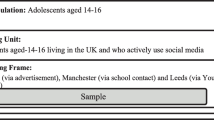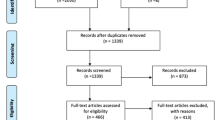Abstract
This study aim to examine parents’ and professionals’ views on the usage of Internet for love and sexual purposes among young people with intellectual disabilities (18–20 years) in Sweden. Five semi-structured focus group interviews were conducted with professionals (n = 8) working on special programmes in upper secondary schools and with parents (n = 5). The interviews were analysed with thematic analysis and the theory of sexual scripts were guiding the process. The results show that the Internet is seen as a social arena with complex challenges; for love and sexuality, for sexual conduct, and for sexual risk and opportunities. Young people with intellectual disabilities are looked upon as more vulnerable than other youth. However, the result also show that parents view the risk of their adolescent of being lonely as greater than the risk of being abused or mislead. A Net-script consisting of rules is geared towards the young people with intellectual disability. Nevertheless, a change to a more flexible and nuanced Net-script is shown while the group of young persons with intellectual disabilities are seen as more heterogeneous than earlier. In-depth knowledge about parents’ and professionals’ perspectives on the Internet and sexuality is important since the young people live in a dependency situation towards their surroundings. In addition, the surroundings’ attitudes and behaviour are essential for the young peoples’ access of support and opportunities to develop their own capacity and to experience love and sexuality.
Similar content being viewed by others
References
McVilly, K., Stancliffe, R.J., Parmenter, T.R., Burton-Smith, R.: “I Get by with a Little Help from my Friends”: adults with intellectual disability discuss loneliness. J. Appl. Res. Intellect. Disabil. 19, 191–203 (2006)
Molin, M., Sorbring, E., Löfgren-Mårtenson, L.: Teachers’ and parents’ views on the Internet and social media usage by pupils with intellectual disabilities. JID 19(1), 22–33 (2015)
Chadwick, D., Wesson, C., Fullwood, C.: Internet access by people with intellectual disabilities: inequalities and opportunities. Future Internet 5, 376–397 (2013)
Löfgren-Mårtenson, L.: Kärlek.nu. Om Internet och unga med utvecklingsstörning [Love. Now—Internet and young people with intellectual disabilities]. Studentlitteratur, Lund (2005)
Löfgren-Mårtenson, L.: Love in cyberspace. Swedish young people with intellectual disabilities and the Internet. SJDR 10(2), 125–138 (2008)
Ritchie, H., Blank, P.: The promise of the Internet for disability: a study of on-line services and web site accessibility at centers for independent living. Behav. Sci. Law 21(1), 5–26 (2003)
Livingstone, S., Haddon, L., Ólafsson, K.: EU Kid Online. London School of Media and Economics, London (2011)
Palmer, S.B., Wehmeyer, M.L., Davies, D.K., Stock, S.E.: Family members’ reports of the technology use of family members with intellectual and developmental disabilities. JIDR 56(4), 402–414 (2012)
Daneback, K., Månsson, S.-A.: Kärlek och sexualitet på Internet. In: Lundberg, P.O., Löfgren-Mårtenson, L. (eds.) Sexologi [Sexology] 3rd edn, pp. 137–142. Liber, Stockholm (2010)
Månsson, S.-A., Daneback, K., Tikkanen, R., Löfgren-Mårtenson, L.: Kärlek och sex på internet [Love and sexuality on the Internet]. Gothenburg University (2003)
Mineur, T.: Skolformens komplexitet – elevers erfarenheter av skolvardag och tillhörighet i gymnasiesärskolan [The complexity of a special type of school]. Doctoral thesis, The Swedish institute for disability research, Halmstad University (2013)
Molin, M.: Delaktighet i olika världar – om övergången mellan gymnasiesärskola och arbetsliv [Different worlds of participation—the transition from upper secondary special programmes to working life for pupils with intellectual disabilities]. University West (2008)
Löfgren-Mårtenson, L., Månsson, S.-A.: “Sex överallt, typ?!” Om unga och pornografi [“Sex every where?!” Youth and Pornography]. Gothia, Stockholm (2006)
Knudsen, S.V., Löfgren-Mårtenson, L., Månsson, S.-A. (eds.): Generation P? Youth Gender and Pornography. Danmarks Pædagogiska forlag, Copenhagen (2007)
Sorbring, E.: Parents’ concern about their teenage children’s Internet use. J. Fam. Issues 35(1), 75–96 (2014)
Sorbring, E., Skoog, T., Bohlin, M.: Adolescent girls’ and boys’ well-being in relation to online and offline sexual and romantic activity. Cyberpsychol. J. Psychosoc. Res. Cyberspace (2014). doi:10.5817/CP2014-1-7
Sorbring, E., Hallberg, J., Bohlin, M., Skoog, T.: Parental attitudes and young people’s online sexual activities. Sex Educ. (2015). doi:10.1080/14681811.2014.981332
Löfgren-Mårtenson, L.: “May I?” About sexuality and love in the new generation with intellectual disabilities. Sex Disabil. 22(3), 197–207 (2004)
Gagnon, J.H., Simon, W.: Sexual Conduct. The Social Sources of Human Sexuality, 2nd edn. Aldine Transaction, New Brunswick, London (1973/2005)
Wibeck, W.: Fokusgrupper - Om fokuserade gruppintervjuer som undersökningsmetod [Focus groups—on focused group interviews as research method]. Studentlitteratur, Lund (2000)
Widerberg, K.: Kvalitativ forskning i praktiken [Qualitative Research in Practice]. Studentlitteratur, Lund (2002)
Taylor, S.J., Bogdan, R.: Introduction to Qualitative Research Methods. A Guidebook and Resource, 3rd edn. Wiley, New York (1998)
Braun, V., Clarke, V.: Using thematic analysis in psychology. Qual. Res. Psychol. 3, 77–101 (2006)
Willig, C.: Introducing Qualitative Research in Psychology. Open University Press, New York (2013)
CODEX: Etiska regler och riktlinjer för forskning [Ethical rules and guidelines for research]. Vetenskapsrådet, Uppsala universitet. http://www.codex.vr.se/. Accessed 1 Mar 2014
Sharabi, A., Margalit, M.: Virtual friendships and social distress among adolescents with and without learning disabilities: the subtyping approach. Eur. J. Spec. Needs Educ. 26(3), 379–394 (2011)
Wiggins, J., Hepburn, S.: Reducing harmful sexual behaviour in adolescents. Art Sci. 16(8), 16–23 (2013)
Johansson, T., Hammarén, N.: Ungdom och sexualitet i gränslandet. Delrapport 1. Ung och kåt? Om ungdomars sexuella berättelser [Youth and Sexuality in Boundary Country. Young and Horny? Sexual Stories by Youth]. Skövde University (2001)
Tikkanen, R.H., Abelson, J., Forsberg, M.: UngKAB09: Kunskap, attityder och sexuella handlingar bland unga [UngKAB09: Knowledge, Attitudes and Sexual Behavior]. Gothenburg University (2011)
Stendahl, K., Balandin, S., Molka-Danielsen, J.: Virual worlds: a new opportunities for people with lifelong disability? J. Intellect. Dev. Disabil. 36(1), 80–83 (2011)
Breck, T.: Riskkommunikation. Dialog om det osäkra [Risk Communication. Dialogue about the Unsure]. Natur och Kultur, Stockholm (2002)
Seale, J.: The role of supporters in facilitating the use of technologies by adolescents and adults with learning disabilities: a place for positive risk-taking? Eur. J. Spec. Needs Educ. 29(2), 220–236 (2014)
Bunning, K., Heath, B., Minnion, A.: Communication and empowerment: a place for rich and multiple media? JARED 22, 370–379 (2009)
Acknowledgments
The authors would like to thank the parents and the professionals for participating in this study.
Funding
This study has been funded by internal university financed research time, and with funding from Swedish Research Council for Health, Working Life and Welfare (FORTE), project no. 2014-0398.
Author information
Authors and Affiliations
Corresponding author
Rights and permissions
About this article
Cite this article
Löfgren-Mårtenson, L., Sorbring, E. & Molin, M. “T@ngled Up in Blue”: Views of Parents and Professionals on Internet Use for Sexual Purposes Among Young People with Intellectual Disabilities. Sex Disabil 33, 533–544 (2015). https://doi.org/10.1007/s11195-015-9415-7
Published:
Issue Date:
DOI: https://doi.org/10.1007/s11195-015-9415-7




